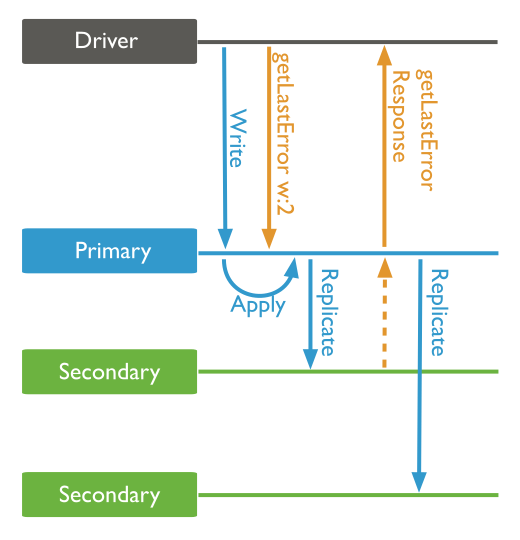- Replication >
- Replication Concepts >
- Replica Set Read and Write Semantics >
- Write Concern for Replica Sets
Write Concern for Replica Sets¶
On this page
MongoDB’s built-in write concern confirms
the success of write operations to a replica set’s primary. Write concern uses the getLastError
command after write operations to return an object with error
information or confirmation that there are no errors.
From the perspective of a client application, whether a MongoDB instance is running as a single server (i.e. “standalone”) or a replica set is transparent. However, replica sets offer some configuration options for write and read operations. [1]
| [1] | Sharded clusters where the shards are also replica sets provide the same configuration options with regards to write and read operations. |
Verify Write Operations¶
The default write concern confirms write operations only on the
primary. You can configure write concern to confirm write operations
to additional replica set members as well by issuing the
getLastError command with the w option.
The w option confirms that write operations have replicated to the
specified number of replica set members, including the primary. You can
either specify a number or specify majority, which ensures the write
propagates to a majority of set members.

If you specify a w value greater than the number of members that
hold a copy of the data (i.e., greater than the number of
non-arbiter members), the operation blocks until those members
become available. This can cause the operation to block forever. To
specify a timeout threshold for the getLastError operation,
use the wtimeout argument. A wtimeout value of 0
means that the operation will never time out.
See getLastError Examples for example invocations.
Modify Default Write Concern¶
You can configure your own “default” getLastError
behavior for a replica set. Use the
getLastErrorDefaults setting in
the replica set configuration. The following sequence of
commands creates a configuration that waits for the write operation to
complete on a majority of the set members before returning:
The getLastErrorDefaults
setting affects only those getLastError commands that
have no other arguments.
Note
Use of insufficient write concern can lead to rollbacks in the case of replica set failover. Always ensure that your operations have specified the required write concern for your application.
See also
Custom Write Concerns¶
You can use replica set tags to create custom write concerns using the
getLastErrorDefaults and
getLastErrorModes replica set
settings.
Note
Custom write concern modes specify the field name and a number of distinct values for that field. By contrast, read preferences use the value of fields in the tag document to direct read operations.
In some cases, you may be able to use the same tags for read preferences and write concerns; however, you may need to create additional tags for write concerns depending on the requirements of your application.
Single Tag Write Concerns¶
Consider a five member replica set, where each member has one of the following tag sets:
You could create a custom write concern mode that will ensure that
applicable write operations will not return until members with two
different values of the use tag have acknowledged the write
operation. Create the mode with the following sequence of operations
in the mongo shell:
To use this mode pass the string use2 to the w option of
getLastError as follows:
Specific Custom Write Concerns¶
If you have a three member replica with the following tag sets:
You cannot specify a custom
getLastErrorModes value to
ensure that the write propagates to the san before
returning. However, you may implement this write concern policy by
creating the following additional tags, so that the set resembles the
following:
Then, create a custom
getLastErrorModes value, as
follows:
To use this mode pass the string san to the w option of
getLastError as follows:
This operation will not return until a replica set member with the tag
disk.san returns.
You may set a custom write concern mode as the default write concern
mode using getLastErrorDefaults
replica set as in the following setting:
See also
Configure Replica Set Tag Sets for further information about replica set reconfiguration and tag sets.